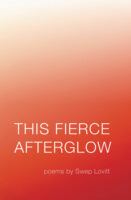The Joy of Simplicity
I enjoy reading poetry collections by poets whose names are new to me. Many times you smell something fresh when a book opens its pages to give you delightful surprises. Swep Lovitt’s This Fierce Afterglow is such a book.
Many poems in This Fierce Afterglow are short but impressive with terse expressions, showing the poet’s persistence in using simplicity and brevity as his poetic style. Lovitt often chooses something happening in daily life as the atom of his poem and sets up a contrast for the reader to ponder, as instanced by “To Our Son, Swep IV” which is an education poem about parental love:
When you watch your eldest,
Swep V, bash baseballs,
Run around the backyard like a maniac,
Arms full, climb the big chair
To read 14 books with Pops—
Remember, you were our little boy.
As you love him, we love you.
Your mother vomiting blood,
Refusing to go to the hospital until
Your football game had ended.
The speaker reminds his son (Swep IV) that while he shows paternal love to Swep V, he should also be able to feel loved by his mother although he has frictions with her. Lovitt uses game watching to help his adult son see his mother’s love and support shown by staying at a football game while she was very sick. Here, education isn’t abstract, nor is love. The mother’s act of love is surely a lesson to the son that love should be both parental and filial.
Brevity takes form especially in “Two Kinds of People.” In 8 lines and 22 words, Lovitt presents two snapshots of the two kinds of human behaviors—“There are those / Who wave until / We are / Out of sight // And others / Who wave, then turn / When we / Start the car”—which help the reader ponder or relate to a similar occurrence. This poem shows also the poet’s creative eye to find useful things for a poem.
“It’s Been a Good Day” is a favorite two-stanza poem. It focuses on two “small” things the speaker does. The first stanza is about the speaker giving fifty dollars to a Hispanic family in a Walmart lot when they are “stranded by their broken Buick / Several states away from home.” The second is about removing a turtle from the road so it will not be crushed by a passing vehicle:
When a turtle closed up his house
On the honking road, I quickly stopped—
Looking both ways, extracted him,
Ferried him across. Our lucky
Day, we could have been squashed.
This poem, like others in This Fierce Afterglow, explores tenderness and sensibility of a human being. The scene of turtles on the road, crawling or crushed, is common in Mississippi. When the speaker spots one closing up inside its shell, his first reaction is to get out of his car and ferry the turtle off the road even though both can be “squashed.” His action shows a human’s tender heart by doing a good thing on a good day, and his humor is heard in the last two lines of the poem.
In short, This Fierce Afterglow shows its uniqueness in using simplicity and thought-provoking language to heighten pleasure in reading as well as sensibility to both human nature and commonality of daily life. It’s a good read.
This Fierce Afterglow: Poems by Swep Lovitt. Madville Publishing, January 2021.
Buy this book from our affiliate Bookshop.org.





